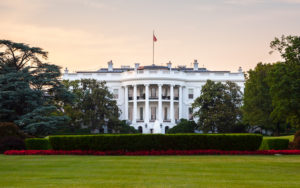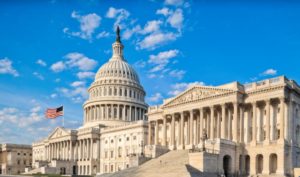
President Biden signs resolutions to overturn Trump-era rules, the Supreme Court upholds voting restrictions, and more…
IN THE NEWS
- President Joseph R. Biden signed three Congressional Review Act (CRA) resolutions that nullify rules from the Trump Administration. The CRA allows the U.S. Congress to overturn the previous administration’s last-minute regulations. The first nullified rule had required the U.S. Equal Employment and Opportunity Commission (EEOC) to give employers more information about victims and witnesses in certain discrimination cases that some worried might enable employer retaliation. The second resolution repealed a regulation issued by the U.S. Environmental Protection Agency under President Trump that rolled back Obama-era limits on methane emissions. The final resolution reversed a U.S. Department of the Treasury rule that permitted lenders to offer loans with interest rates beyond state limits when those lenders partnered with a federally chartered bank in another state with higher interest rate limits.
- In a 6-3 decision, the U.S. Supreme Court upheld two Arizona voting restrictions, ruling that the restrictions did not violate the Voting Rights Act. The Court reversed a decision by a federal appeals court that had ruled that the two voting restrictions—one requiring ballots cast out of precinct to be thrown out, the other limiting who can collect early ballots—imposed a disparate impact on minority groups. Writing for the Court’s majority, Justice Samuel Alito held that the extent of any disparate impact is an important consideration in determining whether a law is in violation of the Voting Rights Act, rather than the mere existence of the impact. Justice Alito also held that preventing voter fraud is a “legitimate state interest” weighing further in favor of upholding the restrictions. In a dissenting opinion, Justice Elena Kagan expressed disappointment in the majority’s decision to uphold laws that “discriminate against minority voters,” arguing that the ruling weakened the Voting Rights Act.
- The Supreme Court ruled that a pipeline developer could use eminent domain—the power of the government to seize property without an owner’s consent—to acquire land owned by New Jersey to construct the PennEast Pipeline. The Court held that the Federal Energy Regulatory Commission properly granted pipeline companies the right to construct in areas most convenient to the public because the states consented to the exercise of eminent domain “at the founding” of the United States. Jim Waltman, executive director of The Watershed Institute—an organization that opposed the pipeline—said that the Institute was “disappointed” by the ruling. But he noted that the project still faced future legal and regulatory obstacles.
- In a 5-4 summary decision, the Supreme Court upheld the federal eviction moratorium, which the Centers for Disease Control and Prevention (CDC) extended through July 31, 2021. Following the eviction moratorium extension, the Alabama Association of Realtors filed an emergency petition asking the Supreme Court to lift the renter protection early to resolve inconsistent legal rulings across the country and relieve property owners from continued losses due to the eviction freeze. The Court issued no written opinion in rejecting the petition. Justice Brett Kavanaugh wrote separately to express his view that the CDC “exceeded its existing statutory authority” in enacting the eviction moratorium, but he voted to uphold its extension through July to support the efficient distribution of federal rental assistance funds. Justice Kavanaugh cautioned that the CDC would need “specific congressional authorization” to extend the moratorium further.
- The Supreme Court allowed the U.S. Environmental Protection Agency (EPA) to continue to grant exemptions to renewable fuel blending requirements for small refineries, even if a refinery previously let the exemption lapse. A provision of the renewable fuel program allows small refineries to avoid EPA requirements designed to increase the use of renewable fuel by requesting a “disproportionate economic hardship” extension. The Justices disagreed about the definition of “extension,” but the majority rejected any requirement that exemption status be maintained without lapse. Cary Coglianese, professor at the University of Pennsylvania Law School, said that the majority “deepened a bias in federal law that tends to favor government agencies’ authority to alleviate or lift regulatory obligations.”
- Judge James Boasberg, a federal trial court judge in Washington, D.C., dismissed an antitrust action brought by the U.S. Federal Trade Commission (FTC) against Facebook but allowed the FTC 30 days to amend its allegations. Judge Boasberg reasoned that the FTC failed to provide sufficient evidence that Facebook holds a monopoly over social networking. Judge Boasberg also noted that, even if the FTC can provide sufficient evidence of Facebook’s alleged monopoly over social media, it has not adequately argued that Facebook has engaged in unlawful activity under the Sherman Act. Judge Boasberg also dismissed a separate antitrust case brought by over 40 states against Facebook. In response to both rulings, U.S. Representative Ken Buck (R-Colo.) stated that “Congress needs to provide additional tools and resources to our antitrust enforcers to go after Big Tech companies engaging in anticompetitive conduct.”
- The National Highway Traffic Safety Administration issued an order requiring companies to report crashes that involve the use of driver assistance systems. The agency said that the order will help it collect information to keep people safe on the roads as technology develops. Violations of the order could result in a daily penalty of about $20,000, capped at a total penalty of about $115 million.
- The White House Council on Environmental Quality extended the deadline by two years for federal agencies to implement a Trump Administration rule requiring agencies to update how they will comply with the National Environmental Policy Act (NEPA). Several state attorneys general and environmental groups had opposed the Trump Administration rule, filing lawsuits to stop the rule. They argued that it would undermine environmental protections by restricting the analysis of environmental impacts and public input on project reviews conducted under NEPA. The extension is intended to prevent agencies from using resources implementing changes that may become outdated as the Biden Administration indicated that it “may soon update” the Trump Administration’s rule anyway.
WHAT WE’RE READING THIS WEEK
- In a recent working paper, Tara M. Sinclair, professor at the George Washington University, and Zhoudan Xie, senior policy analyst at the George Washington University Regulatory Studies Center, examined the relationships between sentiment and uncertainty about regulation in the media and the United States’ economic performance. Sinclair and Xie hypothesized that “poorly designed or excessive regulations” may have a negative impact on the economy and that this negative impact has become more relevant during the COVID-19 pandemic. Sinclair and Xie concluded after analysis that sentiment about regulation has an important impact on the economy, uncovering a trend of long-lasting negative economic impact from negative sentiment shocks about regulation. They noted, however, that regulatory uncertainty caused merely “transitory effects.”
- In an article for the Yale Journal on Regulation’s online bulletin, Amy C. Madl, associate at Finnegan, Henderson, Farabow, Garrett & Dunner, analyzed the implications of “killer acquisitions”—the business practice of buying out competing technologies to eliminate them from the market—on antitrust law. Madl explained that pharmaceutical drug acquisitions are typically not reviewed by the Federal Trade Commission (FTC) because they do not meet the $200 million value threshold. Madl further explained that many overlapping drug acquisitions are not killer acquisitions. Instead, Madl argued, overlapping drug acquisitions may increase market efficiency, or otherwise do not cause net harm to consumers. Madl concluded that heightened scrutiny of below-threshold pharmaceutical acquisitions by the FTC is not necessary.
- In a recent National Bureau of Economic Research working paper, Michael Geruso, professor at the University of Texas at Austin, and Michael Richards, professor at Baylor University’s Hankamer School of Business, studied the unintended impacts from a non-price-setting Medicare policy. Geruso and Richards looked at the impact on non-Medicare patients of Medicare’s reversal of a ban on performing a specific surgical procedure at an outpatient surgery center. They found that doctors started sending both Medicare and privately-insured patients to the outpatient surgical centers for the specific surgical procedure. The data also revealed that the doctors were 70 percent more likely to send non-Medicare patients to the outpatient centers. Geruso and Richards argued that the impacts of Medicare regulatory decisions affect doctor behavior beyond just the “statutory scope of the regulation.”
FLASHBACK FRIDAY
- In an essay in The Regulatory Review, W. Kip Viscusi, professor at Vanderbilt Law School, argued that agencies should set stricter penalties for fatal regulatory violations so that companies will follow safety standards. Viscusi explained that statutory limitations on penalty amounts can lead regulated entities to absorb the cost of fines rather than comply with agency rules. As an example, Viscusi offered that even after the National Highway Traffic Safety Administration imposed maximum sanctions—which are restrained by a statutory cap—on General Motors, the number of fatalities resulting from its faulty product continued to grow. Viscusi concluded that agencies should set penalties based on the “value of a statistical life,” which is a measure of how much a person will pay to reduce the probability of death. Viscusi argued that penalties based on the value of a statistical life would raise penalty amounts and deter noncompliance more efficiently.



